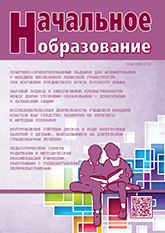Orel, Orel, Russian Federation
The article discusses the features of building the process of familiarizing elementary schoolchildren with scientific methods of cognition (observation, experience) and their application to obtain new knowledge, solve educational, practical and educational-cognitive problems. This direction of educational activity of schoolchildren implements meta-subject learning outcomes in accordance with the requirements of the Federal State Educational Standard of Primary General Education, and also forms the basis of natural-scientific functional literacy among younger schoolchildren. On the basis of the author’s study, the principles of adapting scientific methods of cognition for use as ways of organizing learning activities are determined; the main stages of the formation of the ability of students to use scientific methods of cognition in students are identified.
primary schoolchildren; natural science functional literacy; scientific methods of cognition; observation; an experience; national and international studies on the quality of education
1. Buryak V.K. Problema poznavatel'nyh umenij uchashchihsya [The problem of students' cognitive skills]. Srednee special'noe obrazovanie [Secondary special education]. 1989, I. 6, pp. 33-38.
2. Vinogradova N.F. Koncepciya nachal'nogo obrazovaniya. «Nachal'naya shkola XXI veka» [Primary education concept. "Primary school of the XXI century"]. Moscow, Ventana-Graf Publ., 2017. 64 p. EDN: https://elibrary.ru/YSADBM
3. Vinogradova N.F. Okruzhayushchij mir: uchebnik. 2 kl. [The world around us: a textbook. 2 cl.]. Moscow, Ventana-Graf Publ., 2019. 158 p.
4. Gessen S.I. Osnovy pedagogiki: vvedenie v prikladnuyu filosofiyu [Fundamentals of Pedagogy: An Introduction to Applied Philosophy]. Moscow, Shkola-Press Publ., 1995. 320 p.
5. Kuznecova L.M. Prichiny formalizma znanij uchashchihsya i puti ego ustraneniya [The reasons for the formalism of students' knowledge and ways to eliminate it]. Himiya v shkole [Chemistry at school]. 1990, I. 3, pp. 16-18.
6. Pleshakov A.A., Rumyancev A.A. Velikan na polyane, ili Pervye uroki ekologicheskoj etiki: kniga dlya uchashchihsya nachal'nyh klassov [A giant in a clearing, or the First lessons of environmental ethics: a book for primary school students]. Moscow, Prosveshchenie Publ., 2017. 160 p.
7. A.Yu. Pentin, G.S. Kovalyova, E.I. Davydova Sostoyanie estestvenno-nauchnogo obrazovaniya v rossijskoj shkole po rezul'tatam mezhdunarodnyh issledovanij TIMSS i PISA [State of Science Education in the Russian School Based on the Results of International Studies TIMSS and PISA]. Voprosy obrazovaniya [Education Issue]. 2018, I. 1, pp. 79-109. DOI: https://doi.org/10.17323/1814-9545-2018-1-79-109; EDN: https://elibrary.ru/UOVFAD
8. Timofeeva L.L. Didakticheskie usloviya formirovaniya u uchashchihsya umenij i navykov ispol'zovaniya nauchnyh metodov poznaniya. Kand. Diss [Didactic conditions for the formation of students' skills and abilities of using scientific methods of cognition. Cand. Diss]. Belgorod, 2000. 186 p. EDN: https://elibrary.ru/NLTLTV
9. Usova A.V., Bobrov A.A. Formirovanie uchebnyh umenij i navykov uchashchihsya na urokah fiziki [Formation of educational skills and abilities of students in physics lessons]. Moscow, Prosveshchenie Publ., 1988. 112 p.
10. Formirovanie znanij i umenij na osnovanii teorii poetapnogo usvoeniya umstvennyh dejstvij [Formation of knowledge and skills on the basis of the theory of stage-by-stage assimilation of mental actions]. Moscow, MGU Publ., 1968. 78 p.
11. N.F. Vinogradova, E.E. Kochurova, M.I. Kuznecova Funkcional'naya gramotnost' mladshego shkol'nika: kniga dlya uchitelya [Functional literacy of a younger student: a book for a teacher]. Moscow, Rossijskij uchebnik Publ., Ventana-Graf Publ., 2018. 288 p. EDN: https://elibrary.ru/YPCEXZ
12. How does PISA for Development measure scientific literacy? [Elektronnyj resurs]. Available at: https://www.oecd.org/pisa/pisa-for-development/10-How-PISA-D-measures-science-literacy.pdf (accessed 20 April 2020).






